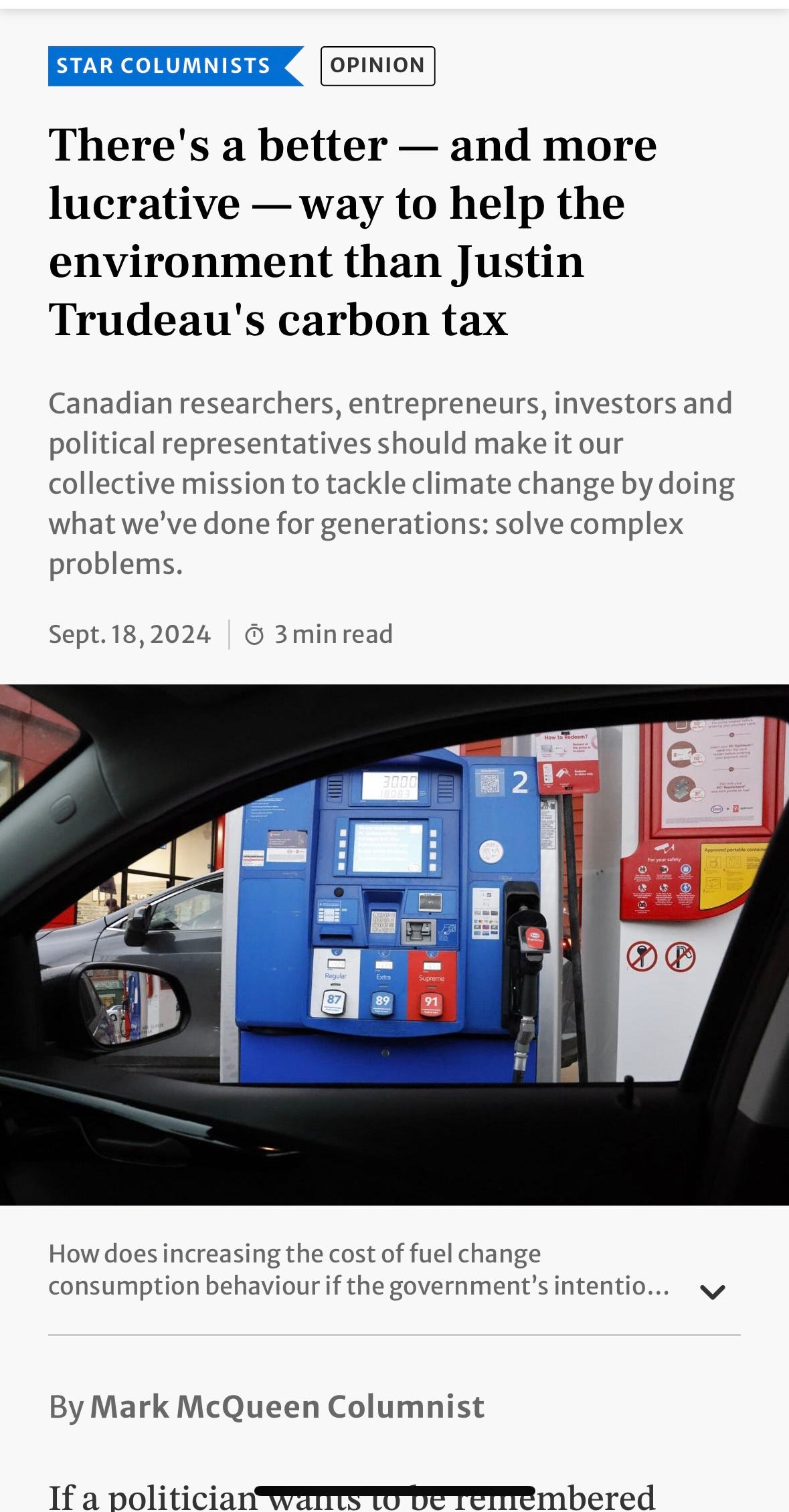There’s a better — and more lucrative — way to help the environment than Justin Trudeau’s carbon tax
How does increasing the cost of fuel change consumption behaviour if the government’s intention was to insulate the vast majority of consumers from feeling any financial pain?
Followers of this Substack will be familiar with my views on this topic, but NDP Leader Jagmeet Singh’s recent capitulation on Prime Minister Justin Trudeau’s circular carbon tax (see prior post “Clean technology advancements, not circular taxes, is Canada's best hope to reduce global greenhouse gasses and grow our economy” May 11-23) presented an opportunity to introduce Toronto Star readers to a different approach for Canada. Whether or not you agree with National Security Advisor Jody Thomas 2023 assessment that climate change was the most pressing national security threat facing Canada, the trillions of dollars that are going to be spent on clean tech products and services are a business opportunity for our researchers, entrepreneurs and investors.
I’ve posted the first half of this week’s column below. If you want to see how it ends, buy a print copy, use your Apple News, or subscribe to the Star online via my special discount code: www.thestar.com/informed.
If a politician wants to be remembered fondly after they’ve been relieved of the mortal coil, they must be courageous during their time in office: Pierre Trudeau, Margaret Thatcher, Ronald Reagan and Brian Mulroney are all prime examples.
Given their cynical moves on Canada’s carbon tax, neither NDP Leader Jagmeet Singh nor Prime Minister Justin Trudeau will likely join that august list.
Justin Trudeau capitulated to pressure from his Atlantic region MPs and removed the carbon tax on home heating oil in 2023, making it a bit rich for some Liberals to call Singh “unprincipled” in the wake of his death bed conversion regarding the “burden” the carbon tax has put on Canadian families.
Whether or not their climate strategy would materially impact global emissions, both Trudeau and Singh could at least boast that their carbon tax was a plan of sorts. Even if I’ve never understood how their particular approach would change our behaviour, when Trudeau claimed his quarterly rebate cheques returned 100 per cent of the incremental cost that most Canadian Swim Dads or Hockey Moms paid to fill up their car.
One doesn’t need to be either for or against putting “a price on pollution” to ask this fundamental question: how does increasing the cost of fuel change consumption behaviour if the government’s intention was to insulate the vast majority of consumers from feeling any financial pain from their aforementioned carbon consumption?
Conservatives are told that they should favour a carbon tax as a political theory, but that’s usually recommended by well-meaning people who’ve never run for office themselves. Former Ontario PC Leader Patrick Brown supported a carbon tax at his first convention as leader in 2016, while Andrew Scheer won the federal leadership a year later as an outspoken opponent of the concept.
That Canada’s share of annual global greenhouse gas emissions is reported to have dropped from three per cent to 1.5 per cent post-Second World War is a function of many things. What can’t be denied is that if Canadians cut that remaining 1.5 per cent share to zero tomorrow, some combination of China, India, Indonesia, South Korea and Vietnam will backfill our environmental sacrifice as they continue to build new coal plants to support their own needs.
Billions of our fellow global citizens want the same modern conveniences and standard of living that we enjoy here in Canada. Until there’s a more cost-effective, environmentally-friendly and scalable source, most nations will consume carbon to drive their vehicles, heat their homes, and all the other things that we took for granted as Canada industrialized.
That’s our business opportunity.
Hit the link to read the rest of the piece.
MRM
(this post is an Opinion Piece)




